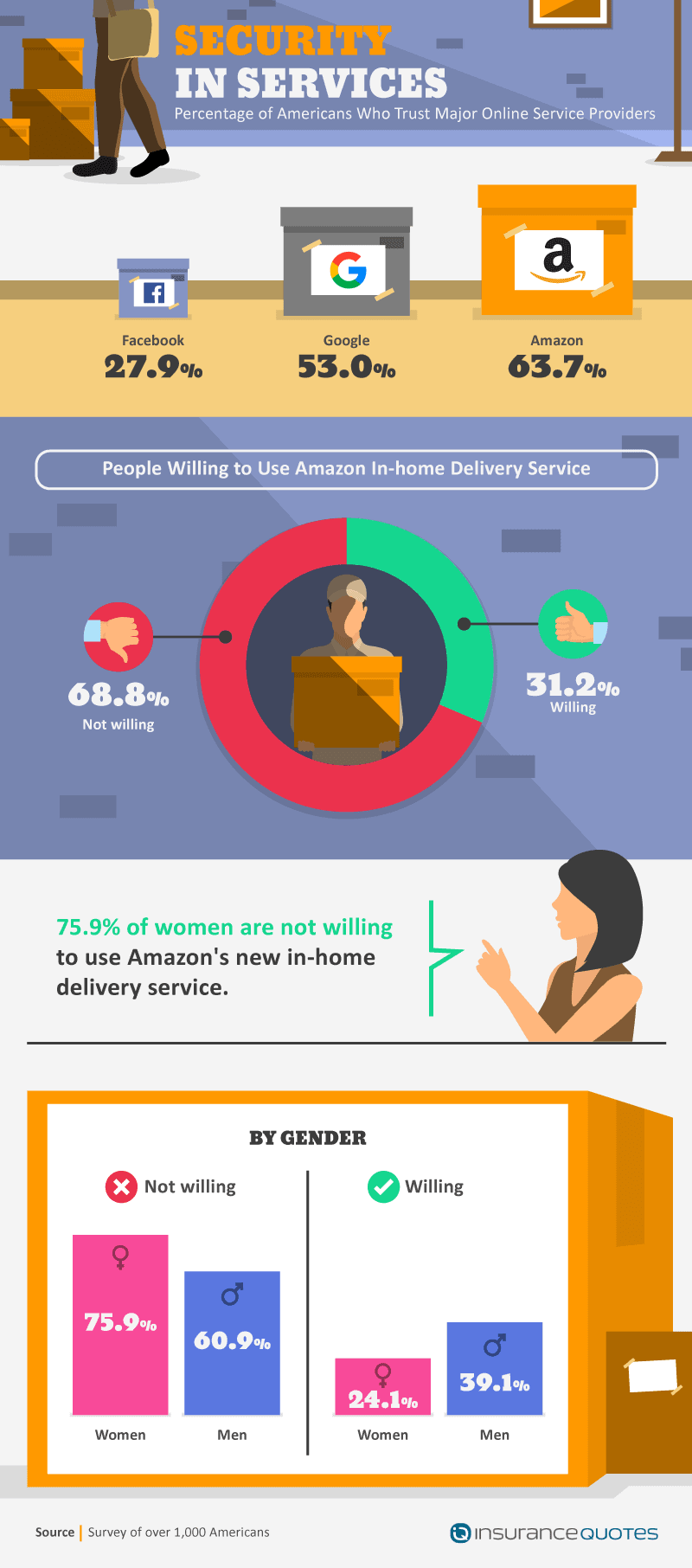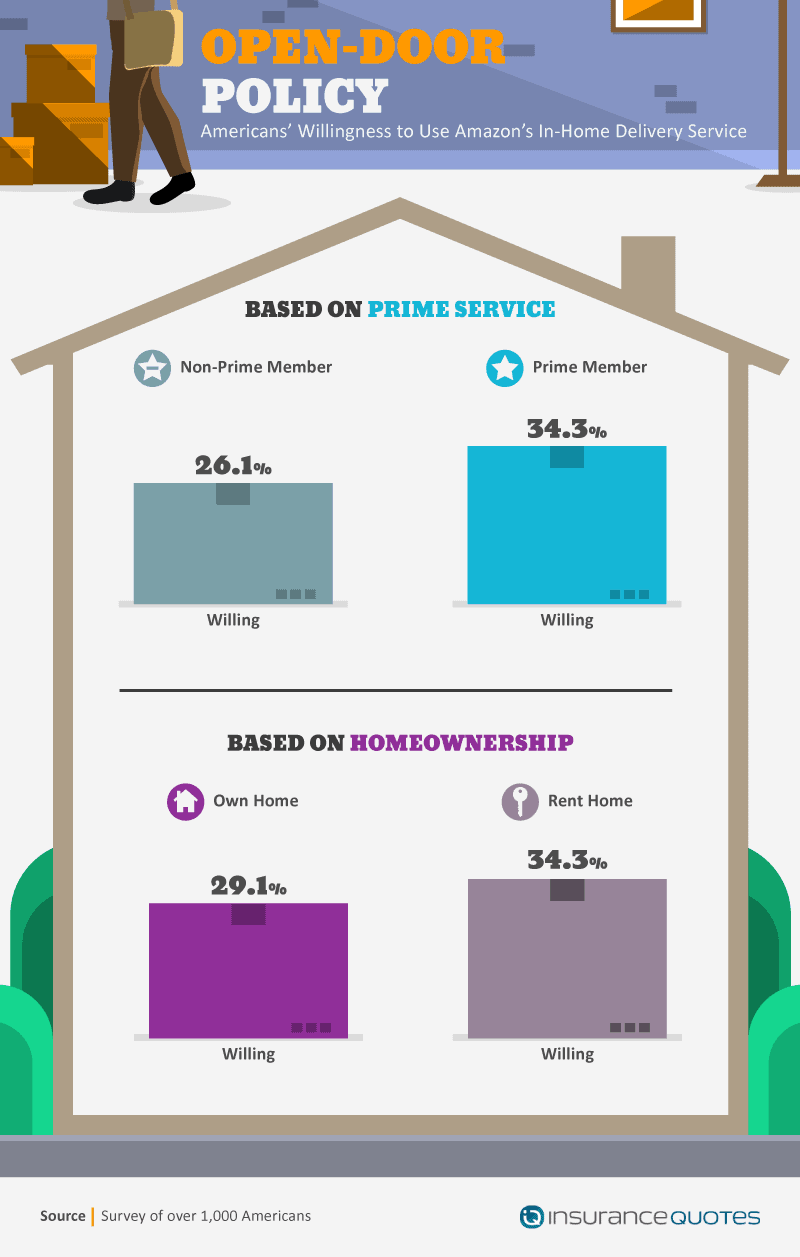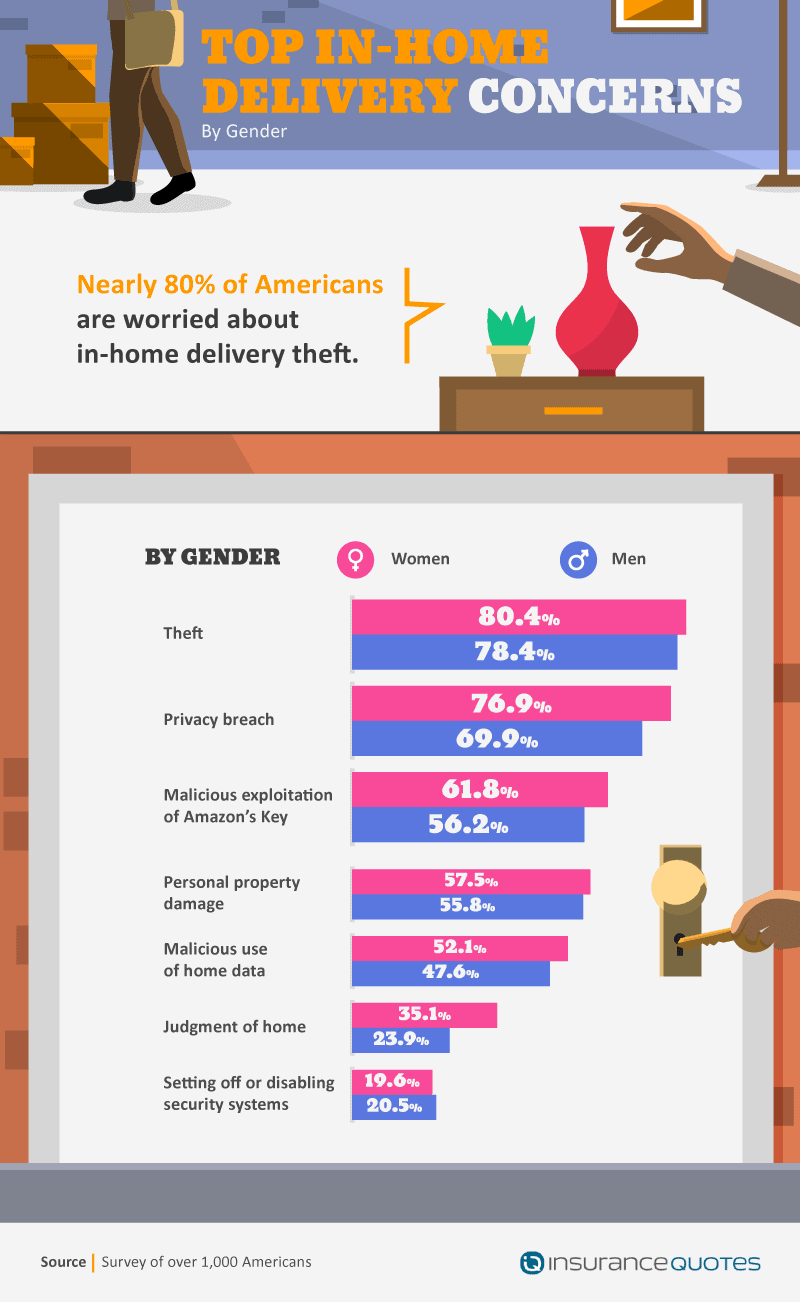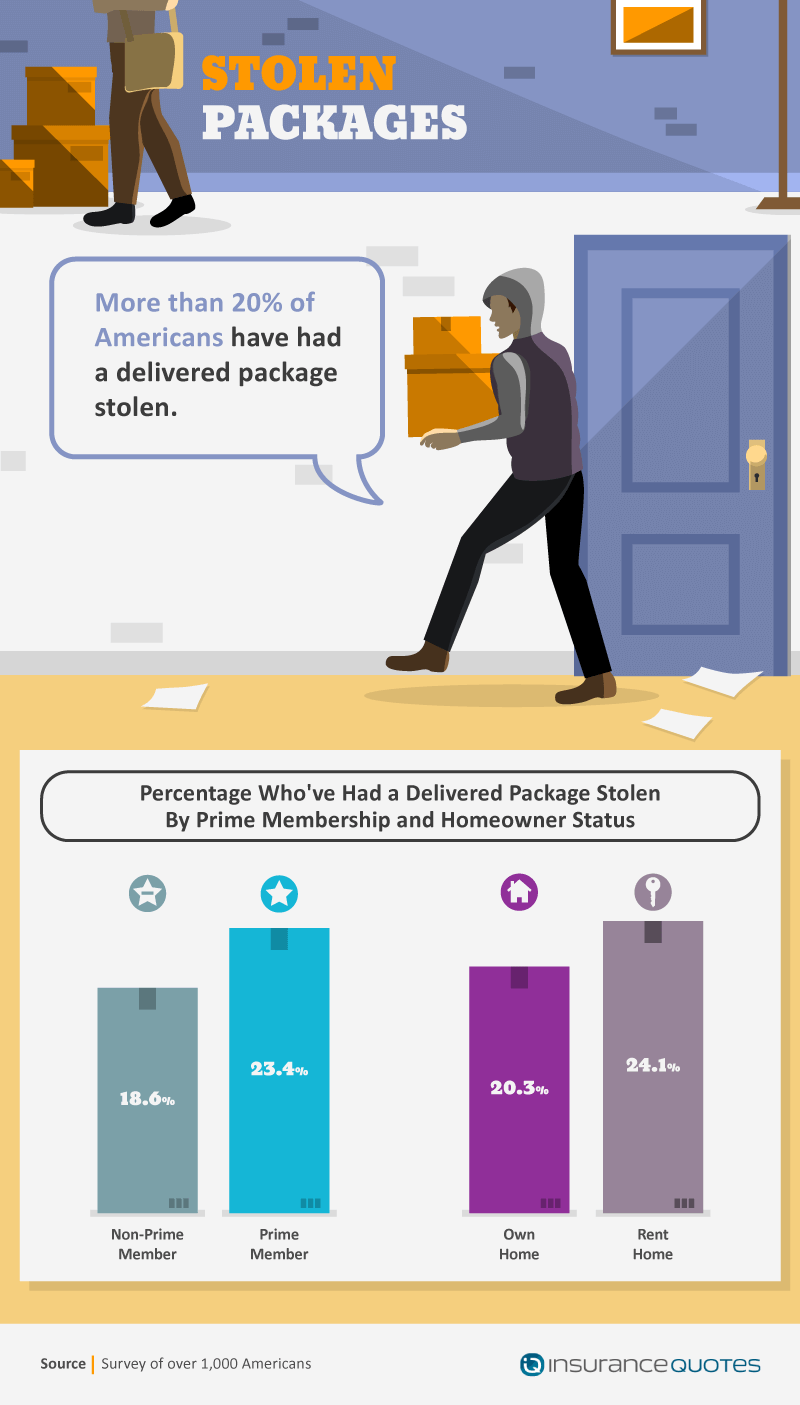Open Door to Delivery

On-demand delivery has come a long way. Companies are challenging the boundaries on convenience, and oftentimes it’s our privacy that gets compromised. Americans know that Facebook (among others) tracks our data, and concerns have been raised over Alexa listening to our private conversations. Now it’s access to our very homes they want, and the question is: Are we ready to grant it? Introducing Amazon Key.
While the announcement of the in-home deliveries has been met with some skepticism, we wanted to know just how much trust people placed in big retailers (and their employees) with access to their home. By asking how they felt about the service, how likely they were to try it out, and what their biggest concerns were with having an unknown delivery agent in their home, we got a pretty good idea of just how well-received this new service might be.
Translating Trust

When it comes to digital trust, Amazon already has a leg up against other well-known online service providers like Facebook or Google. Perhaps because Facebook is so often plagued with stories of “fake news” or concern that Google might be tracking people’s activities without their consent, over 63 percent of people surveyed admitted to trusting Amazon. Considering customers give up more of their personal data to Amazon than virtually any other major tech company, it’s good to know they feel their information is in safe hands.
But how does that translate to real life? Customers might be comfortable with Amazon from an online distance, but when it comes to their homes, our study shows a different side of the story.
Nearly 69 percent of Americans who said they weren’t willing to use Amazon’s in-home delivery service. Women were much less willing, with 75% of them saying they would not use the service, and men (not far behind) at 61%.
Cautiously Curious

Even though overall trust for the new Amazon Key service was relatively low among Americans polled, the millions of subscribers currently enrolled in Amazon Prime could be the program’s saving grace. When asked to rate their willingness to try the in-home delivery program, Amazon Prime members were somewhat more likely to be trusting of the service. While less than 3 percent of non-Prime members were either very willing or extremely willing to give it a shot, nearly 9 percent of Prime customers rated their likelihood the highest on our scale.
Americans who rent their home might be one of the most excited demographics for Amazon Key. While less than 1 percent of homeowners rated their eagerness to try Amazon Key a five, 3 percent of home renters expressed great interest.
Damaging Doubts

With Amazon’s customer trust failing to translate into comfort with their in-home delivery service, we asked people exactly what it was about the Key service that put them off. For 8 in 10 respondents, the answer was clear: the potential for theft.
A bigger concern for women than men, 80 percent of Americans admitted they were afraid of couriers stealing something from their home when granting access through the Amazon Key system. Women polled were far more concerned about potential burglary attempts than men. More than 49 percent of women acknowledged being fearful of theft compared to 33 percent of men.
In reality, those fears could be directed to both the delivery service and tech that monitors employees inside as a security precaution. By the end of 2017, after only having been operational for a month, experts identified a flaw in the system that would allow would-be thieves to freeze or disable the cloud-based camera meant to track and alert customers of their courier’s activity. And even though the smart lock might be susceptible to tampering, Amazon later announced an update that would alert customers if their cameras ever went offline.
Roughly 47 percent of women and 30 percent of men were uncomfortable with the delivery service for fear of a privacy breach. While less concerning overall, over 1 in 5 women and about 1 in 10 men were afraid of couriers judging their homes once inside.
Solving the Delivery Dilemma

While Amazon Key might be one of the company’s most personalized services to date, the program isn’t just aimed at adding convenience – it answers a problem facing millions of Americans with purchases delivered to their front door. In 2015, one study revealed roughly 23 million people reported having a package stolen from their doorstep.
We found more than 1 in 5 Americans had experienced package theft firsthand. Most common among Amazon Prime members than non-members, these loyal shoppers could be exactly the customers Amazon hopes to target with their in-home offering. Amazon Prime is a popular service, but it’s popularity peaks among American households earning over $112,000. With over half of families currently subscribed to Amazon Prime, more than 70 percent of these upper-income households are paying $99 a year for the privilege of free two-day shipping and occasional same-day delivery.
Staying Safe at Home
Whether you decide to let Amazon in to deliver your packages, we’re all at risk for home burglaries or break-ins. In 2016, the FBI recorded over 7.9 million property crimes including burglary, larceny-theft, and arson. Regardless of the safety measures you may take to prevent being a part of this statistic, homeowners insurance can help give you peace of mind and protection in the event of an emergency.
At insuranceQuotes.com, we’ll help you break down the difference between standard coverage and optional upgrades to make sure you have the best protection at the best price. By providing free home insurance quotes from the top providers across the country, insuranceQuotes.com will even help you identify discounts on the perfect policy. Visit us to learn more.
Methodology
We collected 1,013 surveys from 567 women and 445 men who were married or in relationships from Amazon’s Mechanical Turk. Participant age ranged from 18 to 74 with an average age of 35. Statistical testing and weighting were not performed. These data are purely exploratory.
Sources
- http://time.com/money/4754105/amazon-prime-members-total-cost-price/
- https://www.inc.com/tom-popomaronis/amazon-just-eclipsed-records-selling-over-600-items-per-second.html
- https://www.theverge.com/2017/10/25/16538834/amazon-key-in-home-delivery-unlock-door-prime-cloud-cam-smart-lock
- http://www.ajc.com/news/national/amazon-key-delivery-service-that-lets-couriers-into-your-home-met-with-skepticism/lLHWn07YwIo5GCYUDzvPlN/
- https://www.theverge.com/2017/12/21/16804912/facebook-disputed-flags-misinformation-newsfeed-fake-news
- https://www.theverge.com/2017/11/21/16684818/google-location-tracking-cell-tower-data-android-os-firebase-privacy
- http://markets.businessinsider.com/news/stocks/most-trusted-companies-keep-data-secure-chart-2017-6-1002109535
- https://www.wired.com/story/amazon-key-flaw-let-deliverymen-disable-your-camera/
- http://mashable.com/2017/10/25/amazon-key-last-foot-problem/#lXLDz84w1iqa
- http://time.com/money/4294131/amazon-prime-rich-american-members/
- https://www.inc.com/joseph-steinberg/what-to-do-if-a-package-is-stolen-from-your-front-porch.html
- https://www.fbi.gov/news/pressrel/press-releases/fbi-releases-2016-crime-statistics
- https://www.cnbc.com/2017/04/12/nearly-every-american-spent-money-at-wal-mart-last-year.html
- https://www.usatoday.com/story/money/2017/06/01/walmart-tests-employee-delivery-its-battle-amazon/102382666/
Fair Use Statement
Like the information we’ve delivered about this new in-home service? You don’t have to worry about sharing our content. Feel free to repost any of the data or graphics in this article for any noncommercial use. Just ensure a link back to this page, so your readers can see our research in its entirety.
